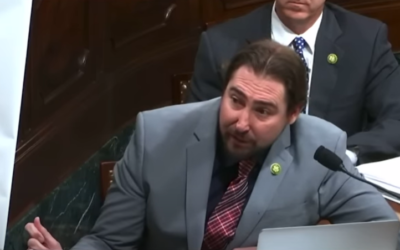By Jonathan Eberle |
Lawmakers on the Arizona Senate Health and Human Services Committee held a tense hearing Monday as state officials faced questions over one of the largest Medicaid fraud scandals in state history, a scheme that exploited the American Indian Health Program and cost taxpayers an estimated $2.8 billion.
Committee Chair Sen. Carine Werner (R-LD4) opened the hearing by describing the fraud as “staggering” and said it exposed major lapses in licensing, monitoring, and fiscal safeguards. She noted that while corrective actions have been taken, the state’s response has sometimes harmed legitimate providers through delayed payments and abrupt regulatory shifts.
Officials from the Arizona Health Care Cost Containment System (AHCCCS), the state’s Medicaid agency, outlined how fraudulent providers recruited vulnerable Native Americans into unlicensed sober living homes. Investigators reported that some individuals were lured with alcohol or drugs, their Medicaid identification numbers used to bill the state for services never provided. In many cases, patients were moved repeatedly between facilities, deprived of food and basic necessities, and in some instances locked inside rooms. The schemes often involved “ghost billing,” duplicate charges, and shell companies.
Marcus Johnson, a deputy director at AHCCCS, told senators the abuse centered on the American Indian Health Program, a fee-for-service system that was exploited between 2020 and 2023. Spending through the program jumped from $84 million to $372 million in just three years, with average monthly costs per patient tripling. Johnson said the agency has since suspended payments to 327 providers and instituted stricter verification of tribal status to prevent non-eligible individuals from being enrolled.
Inspector General Vanessa Templeman detailed the human toll of the fraud. Her teams encountered patients living out of trash bags, denied medical choice, and stripped of personal belongings by facility operators. “Most disturbingly,” she said, “we have seen patients denied informed consent and locked in unsafe conditions.” Templeman emphasized her office has referred multiple cases to law enforcement and continues to work seven days a week investigating suspected abuse.
In response, AHCCCS described reforms that include pre-payment claim reviews, new documentation requirements, temporary provider enrollment moratoriums, and technology upgrades designed to detect suspicious billing patterns more quickly. Officials said the agency has fielded more than 36,000 calls through a dedicated victim hotline and provided emergency lodging to thousands displaced by fraudulent operators.
Despite these efforts, lawmakers pressed for answers on accountability. Chair Werner repeatedly asked who signed off on payments, including $650 million allegedly funneled to an individual in Pakistan. Johnson declined to provide specifics, citing ongoing litigation. Senators voiced frustration, with Werner warning that unanswered questions were unacceptable to taxpayers, providers, and patients still suffering the consequences.
Some members also raised concerns about the impact of heightened scrutiny on legitimate behavioral health providers. Senator Shope noted that reimbursement rates have not been updated in a decade, even as costs have risen, and questioned whether the appeals process for suspended providers is fair. AHCCCS officials maintained that due process is in place, pointing to 104 suspensions that were later rescinded after providers demonstrated compliance.
As the hearing closed, Werner pledged continued oversight, stressing that Arizona must both restore public trust and ensure that fraud prevention measures do not destabilize access to care. “We owe it to the people of Arizona,” she said, “to break the cycle of harm and build a behavioral health system that is transparent and resilient.”
Jonathan Eberle is a reporter for AZ Free News. You can send him news tips using this link.








